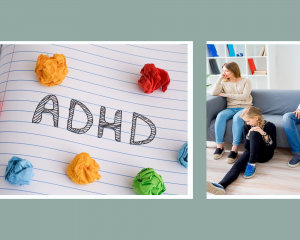ADHD Assessments – Cairns & Other Areas

What is ADHD?
ADHD stands for attention deficit hyperactivity disorder. It is a medical condition (just like diabetes, or other medical conditions). A person with ADHD has differences in brain development and brain activity that affect attention, the ability to sit still, and self-control. ADHD affects the brain’s executive functioning — and the ability to self-regulate and control thoughts, words, actions and emotions.
ADHD often begins in childhood (before the age of 12 years), and can persist into adulthood. It may contribute to low self-esteem, troubled social relationships and difficulties at school or work.
ADHD is often misunderstood and people with ADHD can be labelled “naughty”, “troublemakers”, “dramatic” or other inappropriate descriptions .
It can cause problems with:
- concentration and focus
- becoming distracted
- being hyperactive (sometimes)
- being impulsive
What are the three different types of ADHD?
Inattentive Type – a person is easily distractible
People with inattentive ADHD may have these symptoms:
-
- a tendency to start but not finish tasks
- putting off tasks that need sustained effort
- being easily distracted or daydreaming
- having trouble remembering things
- having difficulty organising tasks, activities, belongings or time
- losing things
- not following instructions
- not paying attention to detail and making careless mistakes
- struggling to focus and concentrate on tasks they find boring or tedious
Hyperactive / Impulsive Type – a person has symptoms of impulsivity and hyperactivity
People with hyperactive ADHD may have these symptoms:
-
- fidgeting and squirming more than others
- talking non-stop and interrupting conversations
- blurting out answers before the question has been finished
- reacting quickly to situations without thinking about the consequences
- badgering their parent, partner or friends when they want something
- finding boredom intolerable
- looking for stimulation
- participating in risk taking or dangerous behaviour
- choosing a smaller reward now rather than a larger reward later
Combined Type – a person has a mixture of symptoms including hyperactivity, inattention and impulsivity.
Some people have symptoms of both inattentive and hyperactive-impulsive ADHD.
What Causes ADHD?
It’s not clear what causes the brain differences of ADHD. There’s strong evidence that ADHD is mostly inherited. Many children and Adults who have ADHD have a parent or relative with it. Children also can be more at risk for it if they were born early, are exposed to environmental toxins, or their mothers used drugs during pregnancy.
** ADHD is not caused by too much screen time, poor parenting, or eating too much sugar.
When should I get an Assessment?
It’s normal for people to get restless and distracted from time to time. But when someone has ADHD, the symptoms are persistent and interfere with work or school, home life and friendships.
If you are concerned that you may have ADHD, the first step is to see a psychologist.
A psychologist can only make a diagnosis after a detailed assessment of the difficulties the person is experiencing and behaviours
There are many behavioural disorders that can cause symptoms of ADHD, especially in young children. It’s important to have a proper assessment.
How is ADHD diagnosed in Australia?
ADHD is diagnosed by meeting the DSM-5 Criteria for ADHD by a health professional who is endorsed to do so.
Numerous assessments must be completed prior to diagnosis, to ensure there is sufficient evidence that the criteria is met, and concerns are documented clinically and correctly.
Who can diagnose ADHD in Australia?
ADHD can be diagnosed by Clinical Psychologist’s in Australia. Confirmation and acknowledgement of this diagnosis is then established with a Pediatrician (child or adolescent) or a Psychiatrist (Adult or Child) who can prescribe medication if required.
What is the process for diagnosing ADHD in Children and Adolescents (Teens)?
Step 1
If you suspect your child or teen may have ADHD, book an appointment for a Clinical Assessment (no GP referral required)
Step 2
Attend the Clinical Interview with your child or teen and discuss the social, emotional and behavioural concerns
Step 3
Discuss with the psychologist which tests will be required depending on the information gathered
Step 4
Undertake assessments
Step 5
Attend the feedback sessions for assessment results and delivery of the Clinical report
Step 6
Book an appointment with a Pediatrician or Children’s Psychiatrist through a GP referral for confirmation of diagnosis and to discuss the way forward for your child or teen
Adult ADHD Assessments
A Clinical Interview, Assessments and reporting resulting in a diagnosis by a Clinical Psychologist is also required for Adults with ADHD.
- Underachievement in school and job roles, despite being “savvy or street smart”
- Over planning and organising, to ensure they are not late or forget things
- Difficulties with social interactions and intimate relationships
- Difficulties with alcohol and other substances (to manage their symptoms)
- Overthinking or analysing, difficulty getting to sleep and staying asleep
- Oversensitive to criticism or feedback
- Difficulties regulating emotions, explosive outbursts
- Getting involved in drama, gossip or things that do not involve them
- Risk taking, financial difficulties, paying bills late and forgetting appointments
- Difficulties watching movies or reading books
- Argumentative with a need to win, or feeling of injustice
- Burnout (emotional and physical)
The steps for diagnosing Adult ADHD are similar to the steps for Children and above, however once diagnosis has been established, Adult’s need to book an appointment with a Psychiatrist to discuss the way forward and prescribe medication, if required.
Usually, once Clinical assessments and reports are completed, the process for seeing a Psychiatrist is straight forward (as the initial tests and reports have been completed).
This should save money and time for Adults with ADHD.
